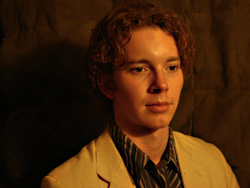Last spring, 23-year-old Joshua Roman was chosen to lead the Seattle Symphony’s cello section, becoming the youngest player in the orchestra. After hearing him, SSO’s audition panel decided to look no further, offering him the job on the spot. (By contrast, they’ve been searching for a concertmaster for nearly three years.) From the very first notes of the symphony’s season—his opening solo in the William Tell Overture—Roman’s playing has proved eloquent and uncommonly mature. He was raised in Oklahoma and trained in Cleveland, where he developed an enthusiasm for contemporary music that set him apart from less independent-minded colleagues. He is already in demand outside Benaroya Hall, playing a Town Hall solo recital and an all-Bach marathon (see the Weekly Wire, p. 31) this weekend alone.
Seattle Weekly: Have you always intended to be an orchestra musician?
Joshua Roman: I never did, and I still don’t, see myself as an “orchestra musician.” I’ve always felt that preparing solely for an orchestra career is a bad thing to do. You’re limiting yourself….I see so many people going into a room and practicing excerpts [of orchestral standard repertory] all day, and going to all the excerpt classes….Usually it’s the last two years of school—their playing changes, their attitude changes, auditions become the focus of their life; the art disappears, and it becomes get a job, get a job, get a job….
You’ve devoted a lot of attention to new music—more than most young string players do.
I don’t play any more new music than any other kind [of music, but] everyone else just plays less….I strongly feel that every composer—well, most composers—deserve to be played with the utmost respect right now, whether or not we think they’re going to last. Play them once—if you really don’t like it, don’t play it again. Time will tell…but the only way the good stuff is going to survive is if we give everything a chance and learn the languages these people are creating.
Looking out into a Seattle Symphony audience, you don’t see a lot of people your age.
A lot of people just sort of mature into classical music, but I don’t think it has to be that way, and I think the classical-music industry is very much at fault for creating this image we have now. The Triple Door [the recital series held there this spring featuring SSO players] is a small step in the right direction—taking music outside of the conventional arena….I love the concert-hall experience, I think it’s a great experience, but the problem is that’s the only one we have.
I’ve played in lots of clubs, I went to Uganda, I played for people who had never heard classical music….I’ve played in living rooms, I’ve played outside in parks. In every situation people have loved the music, if it’s been in a place where they were comfortable….I’ve met a lot of people who didn’t like the pretension of the concert hall or the way they talk on the classical radio station, but I’ve never met anyone who, when in their own comfortable situation, heard classical music and didn’t like something about it.
Is it just a matter of venue? What else should we be doing?
A lot of it starts with attitude….The promoters, the advertisers, the boards—they have this idea that there’s this certain audience you sell classical music to, and they don’t try to step beyond that….It’s become kind of a circle: The people that end up being in charge got there because it sort of started to take this high-society, people-meeting-people direction, and in the end, that’s what became important. A lot of the people in charge don’t actually love the music.
Classical music was marketed for snob appeal for decades, but now it’s keeping people away.
Exactly….On one hand, I would love to see the classical-music industry crumble, just absolutely fall to bits. Because I think then we’d have to start over. We’d have to say, well, what is it? What is classical music? Is it this concert hall, is it these tuxedos? No, it’s this music. And then we could start over from the beginning, build it up, find people who like the music. Like rock and roll started, like the punk movement started.
Where were you in Uganda?
It was at an internal displacement camp; I took my two brothers and my sister and we played string quartets for thousands of people in schools and camps. That was a great experience for me because I’d always believed these things about classical music, that everyone would love it, but this was firsthand experience. These people had never heard of classical music, never heard of a violin or a string quartet, and when we played that music for them, many of them came up to us and said it was the best experience of their life. They remembered the melodies, they got Mozart’s musical jokes—we played Eine kleine Nachtmusik, and they would start laughing….They were just sitting and listening to the music and they got it, and they loved it. And it was so refreshing—this is hard proof, this actually is good stuff.







